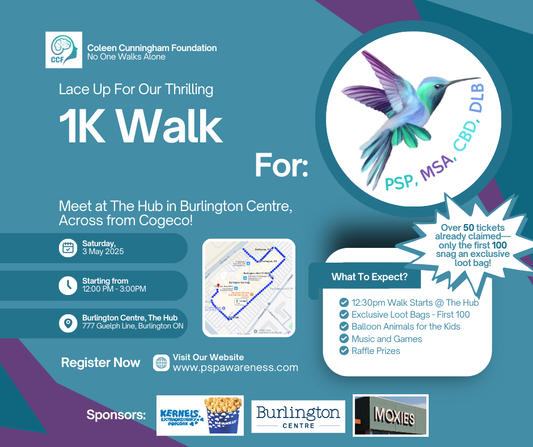Progressive Supranuclear Palsy (PSP) is a complex neurological disorder that affects each individual uniquely. While the journey may differ from person to person, medical professionals often categorize the progression of PSP into four broad stages. In this blog post, we will explore these stages to provide a comprehensive understanding of the disease’s trajectory.
Stage 1: Early PSP
In the early stages of PSP, the symptoms might be quite subtle and easily mistaken for normal aging or other neurodegenerative disorders. Some early signs may include:
- Frequent unexplained falls, typically backwards
- Difficulty with balance and mobility
- Changes in personality, such as increased apathy or mood swings
- Mild issues with eye movement, specifically in controlling upward and downward gaze
During this stage, it's common for individuals to be misdiagnosed with conditions such as Parkinson's disease or even simple aging-related issues. The accurate diagnosis of PSP at this stage can be challenging due to the overlap of symptoms with other conditions.
Stage 2: Mid PSP
As the disease progresses to the mid-stage, the symptoms become more pronounced and start to interfere with daily life. These may include:
- Increased difficulty with eye movements, often leading to blurred or double vision
- Noticeable changes in gait and balance, with frequent falls becoming a major concern
- Difficulty with speech and swallowing, leading to slurred speech and potential choking hazards
- Increased apathy and emotional changes
During this stage, the typical symptoms of PSP become more evident, often leading to a more accurate diagnosis if one hasn't been made already.
Stage 3: Advanced PSP
In the advanced stages of PSP, the symptoms can become severe and significantly affect an individual's quality of life. They may include:
- Severe difficulties with eye movements, sometimes leading to a complete inability to control eye gaze
- Increased difficulty with balance and mobility, often requiring assistive devices for movement
- Severe speech and swallowing issues, often necessitating a modified diet or feeding assistance
- Cognitive issues, such as slowed thought processes and mild memory problems
At this stage, comprehensive care and assistance become crucial for maintaining the individual's comfort and dignity.
Stage 4: Late PSP
The late stage of PSP is the most severe. Individuals at this stage may be largely immobile and require full-time assistance. The symptoms can include:
- Complete loss of eye movement
- Inability to walk or stand, requiring a wheelchair for mobility
- Severe speech and swallowing issues, potentially requiring tube feeding if chosen (always consult with healthcare professionals)
- Significant cognitive impairment
In this final stage, palliative care strategies are employed to ensure the individual's comfort. The focus shifts from treating symptoms to improving the quality of life and providing support to both the individual and their loved ones.
While PSP is a challenging journey, understanding these stages can help patients and their families prepare for the road ahead. A comprehensive, stage-based approach can aid in implementing timely and appropriate care strategies, enhancing quality of life, and fostering hope and resilience along the way.
Although PSP currently has no cure, the value of education, research, community support, and comprehensive care cannot be overstated. Through advancements in medical science and a deeper understanding of PSP, we hope for a future where this condition can be effectively managed, or even cured.
No One Walks Alone!


 Donate
Donate




31 comments
My husband is now in a care home as I could not take care of him any more. He’s having a hard time adjusting and instead of pressing the button for help he is banging on the wall and disturbing others in the night, he’s getting upset and frustrated. Any suggestions, he understands but doesn’t remember that he does it. It’s very upsetting and I think they are getting frustrated with him at night. He has lots of trouble sleeping through the night and wakes up and can’t go back to sleep. Any suggestions for that? He takes Trazadone and we just increased the dose but I think he needs more.
I have just been diagnosed with this illness and am devastated. I am only 68. My lkids have experienced losing grandparents with chronic, progressive illnesses and I would have spared them it again. I am not afraid of dying, but I this means of dying, how do I get my head around it?
Ok I’m looking for some insight/help…my sister is starting to hyperventilate all the time. Sometimes it seems to be when she is more anxious but sometimes she seems to become anxious over seemingly small things like walking across the room to go to the bathroom or to the stair glider. Anyone else having this happen and if so what are you doing about it? I have her breathing in a small brown bag. It helps but should I be doing something else?
I just turned 80. I noticed a slowing down about 2 years ago, but it took until a month ago to get a diagnosis. My speech is very slow, my writing and typing have deteriorated, and my walking is slow and clumsy. My husband, 83, is my caregiver. I’m not looking forward to dying, but neither am I afraid of it. Of much greater concern is losing my ability to express myself.
I was diagnosed last July with a Dextan for Parkinson which I was told Ihad Parkinson. I fell in the beginning of January and broke my left hip. I was told by 2 doctors at UCSD that I have PSP.